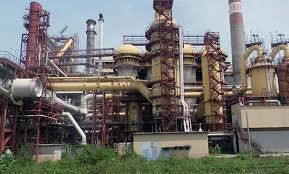For over 40 years, the Ajaokuta Steel Mill, currently with 10, 000 staff members on monthly incomes from tax-payers hard earnings, has stood as a symbol of Nigeria’s unfulfilled industrial promise, despite massive investments. In this in-depth investigation, Africa Health Report’s Juliet Jacob explores the complex reasons behind the mill’s persistent inactivity and examines the efforts of successive governments to revive this dormant giant, shedding light on the challenges and opportunities for Nigeria’s economic growth.
The Still Mill, the Largest in Nigeria
Ajaokuta Steel Company Limited (ASCL), popularly called the, Ajaokuta Steel Mill, Nigeria’s largest steel mill, sits on a vast 24,000-hectare site in Ajaokuta, Kogi State, constructed since 1979. This industrial giant boasts a coke oven and by-products plant that surpasses the combined scale of all Nigerian refineries, making it a critical component of the country’s industrial infrastructure.
The Ajaokuta Steel Company Limited has a rich history that dates back to the 1960s when a feasibility study for steel production was first conducted by the British and later taken over by the Soviet Union under a cooperation agreement with Nigeria.
In 1967, Soviet experts recommended searching for iron ore within Nigeria, as the existing deposits were of poor quality for steel production. This search led to the discovery of suitable iron ore deposits in Itakpe, Ajabanoko, and Oshokoshoko in 1973.
The Ajaokuta Steel Company Limited was officially incorporated in 1979 under President Shehu Shagari, marking the beginning of the steel mill project. By the time President Shagari left office in 1983, the project was already 84% complete.
Crippled by Mismanagement
The Steel Mill, a colossal industrial project with vast potential, has languished for decades due to crippling mismanagement, chronic delays, and incomplete construction, leaving the nation in a state of perpetual anticipation, questioning when this gargantuan facility will finally achieve its promised production capacity and fulfil its destiny as the bedrock of Nigeria’s industrialization.
Decades of mismanagement have hindered Nigeria’s industrial ambitions, as evident in the stalled Ajaokuta Steel Mill and its complementary standard gauge railway project. In 1987, Julius Berger was contracted to build the railway, linking Itakpe’s iron mines to the steel mill and ultimately to the Atlantic Ocean at Warri, ensuring a steady supply of raw materials and market access.

Despite this visionary plan, the steel mill remains unfinished four decades after construction commenced, and the railway project has suffered similar delays, undermining Nigeria’s economic growth and industrialization aspirations.
Nigeria’s Still Dream Deferred
Nigeria’s Ajaokuta Steel Mill, once hailed as a beacon of industrialization, remains dormant despite reaching 98% completion in 1994 under General Sani Abacha’s military junta. Shockingly, it has yet to produce a single sheet of steel.
Years of mismanagement, concessions to Japanese and Indian companies, and unfulfilled promises have stalled progress. However, recent developments offer a glimmer of hope. Discussions with Chinese steel company Luan Steel Holding Group and Russian support have sparked renewed optimism.

The Nigerian government’s payment of $496 million to Global Steel Holdings Limited in 2022 has paved the way for fresh efforts to revive the steel mill. Stakeholders emphasize that reviving the steel industry is crucial for Nigeria’s economic growth, job creation, and infrastructure development.
President Obasanjo’s Efforts
The Ajaokuta Steel Mill’s revival efforts have been marked by a series of false starts and controversies. In 2002, the Nigerian government, led by President Olusegun Obasanjo, concessioned the project to Japanese Kobe Steel, but this attempt at revitalization yielded little success.
Two years later, the project was transferred to Ispat Industries, financed by Global Infrastructure Holdings Limited (GIHL), now Global Steel Holdings Limited (GSHL), chaired by Indian steel magnate Pramod Mittal.
However, the concession ended abruptly in 2008 when the government accused GIHL of asset-stripping, prompting GIHL to sue Nigeria at the International Chamber of Commerce.
The dispute was eventually resolved in 2016, with Nigeria regaining control of the Ajaokuta Steel Mill in exchange for GIHL retaining the Nigerian Iron Ore Mining Company (NIOMCO) operating at Itakpe.
In a bid to finally put the matter to rest, the Nigerian government paid $496 million to GSHL in 2022 to settle the outstanding claims. This development marked a significant step towards reclaiming the steel mill’s potential, but the journey to revitalization remains a mirage.
A Potential Boost to the Economy
Nigeria’s economy has suffered significantly due to the prolonged delay in reviving the Ajaokuta Steel Company, according to experts. The inactivity of the steel mill has resulted in widespread unemployment, capacity gaps, and redundancy, perpetuating a cycle of economic stagnation.
To address these challenges, stakeholders propose a multifaceted approach. This includes increased funding to revitalize the steel mill, a comprehensive audit to identify areas of inefficiency, and the strategic re-engagement of retired staff with valuable expertise.
In a long-awaited boost to Nigeria’s economy, the Ajaokuta Steel Mill is believed to be a cash cow for revitalization, with promising potential to drive industrialization, stimulate economic growth, and create thousands of job opportunities.
With targeted financial support, operational reforms, and strategic deployment of human capital, experts say the steel mill can finally unlock its vast potential, paving the way for a more prosperous future for Nigeria. This critical infrastructure project, dormant for decades, is now on the cusp of transformation, offering renewed hope for Nigeria’s industrial and economic resurgence.
Potential for 500,000 Jobs
The industrial giant is believed to have the potential to transform Nigeria’s economy, providing materials for infrastructure development and generating extensive employment opportunities.
Upon completion, the plant is expected to create 10,000 direct jobs in its first phase, with a significant multiplier effect projected to produce an additional 500,000 indirect jobs, revolutionizing the country’s industrial and employment landscapes.
It is estimated that the Federal Government will have to be committed to spending $2 billion to resuscitate the company, paving the way for the steel mill’s revitalization.
Experts said the massive investment will restore the facility to its former glory, unlocking its vast potential and transforming Nigeria’s industrial landscape.
Once operational, the Ajaokuta Steel Mill is expected to drive economic growth, stimulate development, and provide much-needed employment opportunities for hundreds of thousands of Nigerians. The project’s revival is a significant step towards diversifying Nigeria’s economy and reducing dependence on oil exports.
Current workforce
According to what is on its website, the Ajaokuta Steel Company Limited currently has around 10,000 workers on its payroll during its initial commissioning phase. This number was then expected to surge, with estimates suggesting over 500,000 jobs that would have been be created in connected industries nationwide.
Government Spending N29.606 Billion on Salaries from 2016 to 2023
Despite current non-production, the company maintains a substantial workforce, with the government spending N29.606 billion on salaries from 2016 to 2023. Offices in Abuja, Lagos, and Ajaokuta, Kogi State, underscore its nationwide presence.
The Steel Complex was conceived to become a Metallurgical Process Plant and Engineering Complex. However, mismanagement and incomplete construction have hindered progress, despite being 98% complete in 1994.
President Tinubu’s Promise

President Bola Tinubu pledged to breathe new life into the long-abandoned Ajaokuta Steel Mill, after he took oath of office, a project that has been dormant for decades despite numerous promises from previous administrations.
This commitment aligns with his Renewed Hope Agenda, which prioritizes economic diversification as a key driver of growth.
The ambitious goal is to boost Nigeria’s economy to over $1 trillion by the end of his first term, a vision that relies heavily on the successful resuscitation of the steel mill.
The Steel Mill, once hailed as Nigeria’s bedrock of industrialization, has languished in a state of disrepair since its construction began in 1979. With 40 out of 42 plant units completed, the facility remains idle, symbolizing the country’s struggle to achieve industrialization.
Minister of Steel Development’s Commitment

President Bola Tinubu took a significant step towards reviving the Ajaokuta Steel Mill by appointing Prince Shuaibu Audu, an indigene of Kogi, as the Minister of Steel Development. Audu’s success would not only be a source of pride for Nigeria but also for his kinsmen, and he’s committed to delivering.
Upon taking office, Audu outlined a collegiate approach to revive the plant, involving a three-year roadmap with short and medium-term plans. The plan includes concessioning units to competent investors due to the substantial funds required, estimated to be around $2-5 billion.
Audu has already set the ball rolling by initiating the revival of the Light Mill Section, which is expected to produce 400,000 metric tonnes of iron rods annually.
These rods will be used to construct 30,000 kilometers of roads across Nigeria’s six geopolitical zones during Tinubu’s first term. This development is a crucial step towards Nigeria’s industrialization and economic growth.
Senator Natasha Akpoti, Unreachable

Efforts made by this newspaper to get Senator Natasha Akpoti’s perspective on the Ajaokuta Steel Mill’s decades-long inactivity were unsuccessful. As the senator representing Kogi Central, which encompasses Ajaokuta, her insights would have been invaluable.
Senator Akpoti, a barrister and social entrepreneur, has been a vocal advocate for the steel mill’s revitalization, having presented an investigative report to the National Assembly in 2018 highlighting corrupt activities and mismanagement.
Our reporter’s efforts to reach her for comment were unsuccessful, leaving questions about the mill’s future and potential solutions unanswered.
As the Ajaokuta Steel Mill remains idle, Nigerians are left wondering if this behemoth of industrial potential will ever fulfil its promise. Despite decades of failed revitalization efforts, successive governments continue to pledge renewal. But will it remain an elusive dream? Or, is it safe to conclude is a dream shattered?


